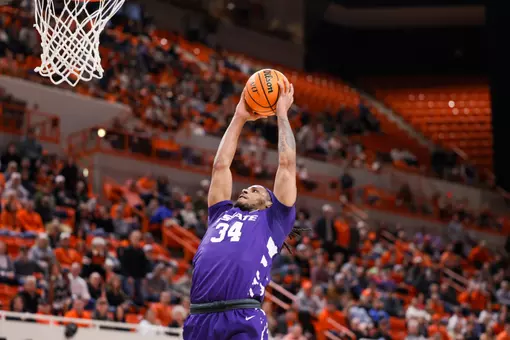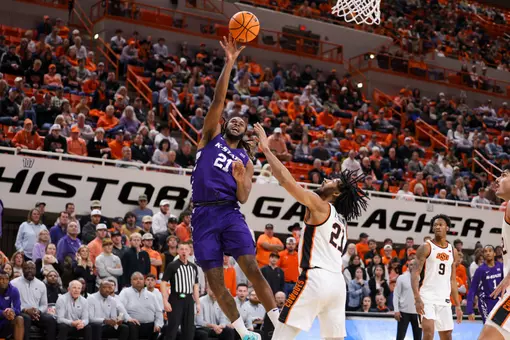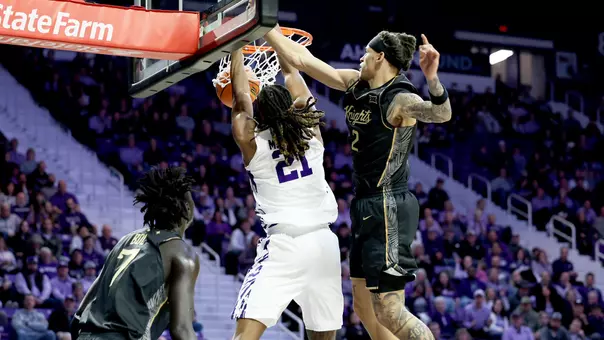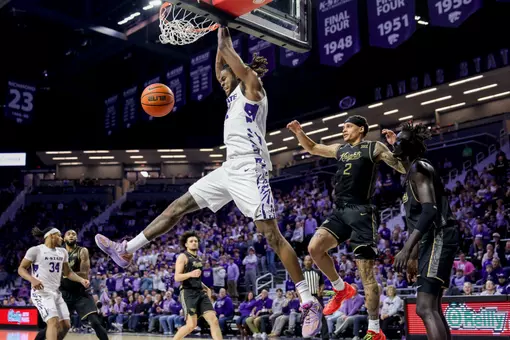Men's Basketball
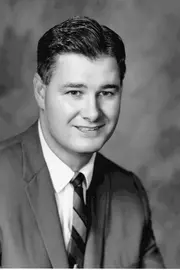
Fred Winter
- Title:
- Head Coach
Morice Fredrick “Tex” Winter was an assistant coach during Jack Gardner’s glory years. He was a natural to succeed his mentor, although the early years were tough. So tough, in fact, that at one point signs sprouted saying, “Spring is here, Winter must go.”
Fortunately, Winter stayed, and it was a “long, hard Winter” for K-State foes for 15 years. An innovator of the “triangle offense,” he earned a reputation as one of the most creative offensive coaches in the land and in 1962, published a book on the offense entitled The Triple-Post Offense.
Winter owns the second-most wins (261) of any Kansas State coach, and laid claim to more league titles (eight) than any other Wildcat coach. He would lead the school to postseason play seven times, including six trips to the NCAA Tournament. K-State won the Big Eight Holiday Tournament four times under his leadership, and achieved top 20 finishes on four occasions.
He helped the Wildcats to a No. 1 ranking twice in his career, including for the first time in school history for four weeks in late February and early March 1958 and again for two weeks at the end of the 1959 season. Eleven players achieved all-league honors under Winter, and two (Jack Parr and Bob Boozer) were All-Americans. He was also named the United Press International (UPI) National Coach of the Year in 1959.
There were several outstanding teams under Winter, two of which made trips to the Final Four in 1959 and 1964. Spearheaded by the play of Bob Boozer, the 1958-59 team was ranked among the nation’s top-5 for most of the season and spent numerous weeks as the nation’s No. 1 ranked team before falling in the Midwest Regional Finals to Oscar Robertson and No. 5 Cincinnati. Then, in 1964, the Wildcats charged back to the Final Four, finally being eliminated by eventual champion UCLA, 90-84.
A native of Huntington Park, Calif., Winter began his coaching career as the first full-time assistant at K-State for Jack Gardner from 1947-51. Like Gardner, he graduated from USC [in 1947], where he learned the triangle offense from Sam Barry. An All-American pole vaulter for the Trojans, he became the youngest coach in the nation at Marquette in 1951, guiding the Warriors to the National Catholic Championship in his first season. After his second season at Marquette, he replaced Gardner as head coach at K-State in 1953.
Following his departure from K-State in 1968, Winter served shorter stints as head coach at Washington (1969-72), the NBA’s Houston Rockets (1972-74), Northwestern (1975-78) and Long Beach State (1978-83). In total, he won 454 games in college, while he went 51-78 with the Rockets.
In 1985, Winter started another chapter of his life, serving as an assistant coach with the NBA’s Chicago Bulls under famed 11-time championship head coach Phil Jackson and teaching the triangle offense to Michael Jordan. Winter was hired to the position by Chicago general manager Jerry Krause, an old friend he had met while at K-State.
As a assistant to Jackson, Winter was an integral part of the Bulls' NBA championships in 1991, 1992, 1993, 1996, 1997 and 1998. He followed Jackson to the Los Angeles Lakers in 1999, where he collected four more championship rings in 2000, 2001, 2002, and 2009.
A member of both the state of Kansas Sports Hall of Fame and K-State Sports Hall of Fame, Winter earned recognition to the National Collegiate Basketball Hall of Fame in 2010 and the Naismith Memorial Basketball Hall of Fame in 2011. He is the fourth person with K-State ties in the Naismith Hall of Fame, joining former mentor Jack Gardner who was elected in 1984, former player Bob Boozer, who was a part of the 1960 U.S. Olympic Team elected in 2010 and Mitch Richmond, who was selected in 2014.
This was Winter’s second honor from the Naismith Hall of Fame, as he was named the 1998 winner of the John Bunn Award for lifetime achievement. K-State once again honored Winter in January 2015 by dedicating the drive leading to the Wildcats’ Ice Family Basketball Center in his name.
One of only two people to be affiliated with all four of K-State’s Final Four teams, Winter passed away at the age of 96 on October 10, 2018 at his home in Manhattan, Kansas.
Fortunately, Winter stayed, and it was a “long, hard Winter” for K-State foes for 15 years. An innovator of the “triangle offense,” he earned a reputation as one of the most creative offensive coaches in the land and in 1962, published a book on the offense entitled The Triple-Post Offense.
Winter owns the second-most wins (261) of any Kansas State coach, and laid claim to more league titles (eight) than any other Wildcat coach. He would lead the school to postseason play seven times, including six trips to the NCAA Tournament. K-State won the Big Eight Holiday Tournament four times under his leadership, and achieved top 20 finishes on four occasions.
He helped the Wildcats to a No. 1 ranking twice in his career, including for the first time in school history for four weeks in late February and early March 1958 and again for two weeks at the end of the 1959 season. Eleven players achieved all-league honors under Winter, and two (Jack Parr and Bob Boozer) were All-Americans. He was also named the United Press International (UPI) National Coach of the Year in 1959.
There were several outstanding teams under Winter, two of which made trips to the Final Four in 1959 and 1964. Spearheaded by the play of Bob Boozer, the 1958-59 team was ranked among the nation’s top-5 for most of the season and spent numerous weeks as the nation’s No. 1 ranked team before falling in the Midwest Regional Finals to Oscar Robertson and No. 5 Cincinnati. Then, in 1964, the Wildcats charged back to the Final Four, finally being eliminated by eventual champion UCLA, 90-84.
A native of Huntington Park, Calif., Winter began his coaching career as the first full-time assistant at K-State for Jack Gardner from 1947-51. Like Gardner, he graduated from USC [in 1947], where he learned the triangle offense from Sam Barry. An All-American pole vaulter for the Trojans, he became the youngest coach in the nation at Marquette in 1951, guiding the Warriors to the National Catholic Championship in his first season. After his second season at Marquette, he replaced Gardner as head coach at K-State in 1953.
Following his departure from K-State in 1968, Winter served shorter stints as head coach at Washington (1969-72), the NBA’s Houston Rockets (1972-74), Northwestern (1975-78) and Long Beach State (1978-83). In total, he won 454 games in college, while he went 51-78 with the Rockets.
In 1985, Winter started another chapter of his life, serving as an assistant coach with the NBA’s Chicago Bulls under famed 11-time championship head coach Phil Jackson and teaching the triangle offense to Michael Jordan. Winter was hired to the position by Chicago general manager Jerry Krause, an old friend he had met while at K-State.
As a assistant to Jackson, Winter was an integral part of the Bulls' NBA championships in 1991, 1992, 1993, 1996, 1997 and 1998. He followed Jackson to the Los Angeles Lakers in 1999, where he collected four more championship rings in 2000, 2001, 2002, and 2009.
A member of both the state of Kansas Sports Hall of Fame and K-State Sports Hall of Fame, Winter earned recognition to the National Collegiate Basketball Hall of Fame in 2010 and the Naismith Memorial Basketball Hall of Fame in 2011. He is the fourth person with K-State ties in the Naismith Hall of Fame, joining former mentor Jack Gardner who was elected in 1984, former player Bob Boozer, who was a part of the 1960 U.S. Olympic Team elected in 2010 and Mitch Richmond, who was selected in 2014.
This was Winter’s second honor from the Naismith Hall of Fame, as he was named the 1998 winner of the John Bunn Award for lifetime achievement. K-State once again honored Winter in January 2015 by dedicating the drive leading to the Wildcats’ Ice Family Basketball Center in his name.
One of only two people to be affiliated with all four of K-State’s Final Four teams, Winter passed away at the age of 96 on October 10, 2018 at his home in Manhattan, Kansas.
